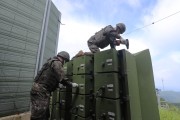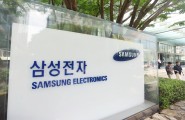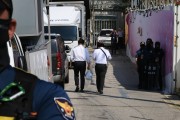S. Korea stands firm as Google, Apple push to export sensitive map data

A key issue pushed by US tech giants Google and Apple ― the export of South Korea’s high-precision map data ― was notably excluded from last week’s Korea-US tariff negotiations, underscoring Seoul’s firm stance that its national security is not up a bargaining chip.
According to industry sources and the presidential office on Sunday, the Korea-US trade discussions on Thursday focused largely on conventional tariff and commerce issues. The topic of high-precision map data exports, previously flagged by the Office of the US Trade Representative, was not included in the agenda.
"There were extensive talks with USTR on high-precision map data and agricultural products, but those topics were set aside as the talks progressed rapidly on trade issues," the presidential office said in a press briefing Thursday, adding that such issues were "defended" from negotiation.
Industry observers note that the Korean government’s omission of the topic reflects a deliberate decision to prioritize national security and industrial sovereignty over potential trade frictions.
“Map data is a national security asset,” said an industry source who requested anonymity. “It’s meaningful that the government upheld the principle that security cannot be treated as a matter of trade.”
Google filed its third request in February to export 1:5,000-scale map data to its overseas servers, citing the inability to offer full-fledged mapping services in Korea without it. Apple submitted a similar request in June, although unlike Google, it has domestic servers and has expressed willingness to accommodate government demands related to data masking and security protocols.
The 1:5,000 scale maps, which display real-world distances of 50 meters as 1 centimeter on the map, are essential for applications like urban planning and infrastructure development. Google and Apple argue that current 1:25,000 scale maps are inadequate for navigation services, especially for autonomous vehicles and tourist guidance.
The map data export debate reignited in March, when the USTR labeled South Korea as the only major market restricting location-based data exports. Domestic industry players’ concerns have since grown over the possibility of security breaches and an unfair advantage for foreign tech firms.
During a recent confirmation hearing, Kim Yun-duk, nominee for minister of land, infrastructure and transport, echoed these concerns. “Map data of 1:5,000 scale is highly sensitive and no other country in the world has disclosed it for export,” he said. “Security and public safety take precedence over trade concerns.”
ICT Minister Bae Kyung-hoon and Culture Minister Chae Whi-young both underscored the need to assess national security risks and the impact on domestic industries before considering such exports.
Although Google proposed more flexible terms ― including data blurring, direct communication channels and senior-level engagement ― it sparked backlash by requesting the exact coordinates of security facilities for blurring purposes.
Experts warned it could effectively hand over the precise locations of military and sensitive sites to a foreign private entity.
Cases such as the exposure of Ukrainian military facilities via Google Maps during the ongoing Russian invasion there have fueled such concerns, highlighting the possibility of high-resolution map misuse in wartime and the risk of terror attacks.
The debate also touches on economic fairness. Despite operating in Korea, Google pays less in corporate taxes because it does not possess local server infrastructure.
Last year, it paid only 17.2 billion won ($12.4 million) in corporate taxes to the Korean government, far less than local tech giants Naver (384.2 billion won) and Kakao (157.1 billion won), both of which operate domestic data centers and use locally sourced map data.
Google and Apple’s push for high-precision maps is widely seen as part of a strategic effort to gain first-mover advantages in artificial intelligence-powered industries such as autonomous driving, augmented reality and digital twins.
A Korean government panel composed of eight ministries ― including the Defense, Foreign Affairs and ICT ministries ― is to meet Friday to deliberate on Google’s request to export high-precision national base maps, according to the National Geographic Information Institute.
The Geospatial Data Export Review Committee, responsible for reviewing the overseas transfer of geospatial data deemed sensitive to national security, is also considering postponing its decision, which is currently due by Aug. 11. The final outcome may be influenced by the results of a potential Korea–US summit, expected to take place sometime in the same week.
The committee had previously deferred its decision in May, citing the need for further discussions on the implications for national security and domestic industries. At that time, the review period was extended by 60 days to Aug. 11.
"The deadline for a decision will likely be extended after each ministry presents its position within the consultative body,” said a government official who requested anonymity. “There are concerns that concluding the Korea-US summit could affect other agenda items scheduled for the talks.”
“Although the topic was excluded from this week’s round of tariff talks, the outcome of the interministerial review could alter the situation. We hope the panel makes a wise decision,” the anonymous industry source said, speaking late last week.
Calls are also growing for a more comprehensive legal framework. For nearly two decades, foreign companies have repeatedly sought access to Korea’s precision mapping data, yet the Korean government still lacks codified standards or regulations for such requests.
In June, Ahn Gyu-back, the current defense minister who was then a lawmaker, introduced an amendment to the Act on the Establishment and Management of Spatial Information, proposing to restrict the export of maps scaled finer than 1:25,000 and to mandate domestic server infrastructure and security safeguards for any approved exports.
yeeun@heraldcorp.com




